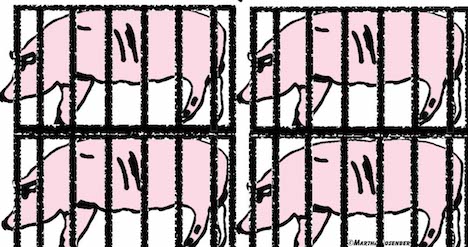| Most people have seen images of cruel "factory farming." "We confine animals in small cages and crates; mutilate them by cutting off their tails or beaks without painkillers; slaughter them when they're too sick or injured to walk; and cause them immense chronic pain and disease through unhealthy breeding practices that swell their size and unnaturally accelerate their reproduction," writes Wayne Pacelle of HSUS. But factory farms are also the nation's biggest polluters, contaminating soil, air and water. For example, Tyson Foods alone released 104.4 million pounds of toxic pollutants into waterways between 2010 and 2014 according to a report by Environment America. In 2003, Tyson the second worst polluter of U.S. waterways second to a polluting steel manufacturing company, pleaded guilty to violating the Clean Water Act with effluvia from its Sedalia, MO facility and agreed to pay $7.5 million. But before its probation ended, Tyson was charged by the state of Oklahoma with polluting the Illinois River watershed. Poultry polluters eject as much phosphorous into the watershed as a city of ten million people, said State Attorney General Drew Edmondson in bringing charges. Factory farming and the mismanagement of fertilizers also have long been known to cause huge "dead zones" in the Gulf of Mexico, Chesapeake Bay and elsewhere. A 1998 EPA study found 35,000 miles of streams in 22 states and ground water in 17 states that had been polluted by factory farms. Even though six of the top 15 polluting industries in the U.S. are food producers--even paper and gasoline producers pollute less--these factory farm polluters are exempt from federal water-pollution regulation.
Factory Farms Harm Workers It is ironic that many people who are against immigration or foreign workers would be paying ten dollars or more for their fast food hamburgers without cheap workers from other countries. The huge kosher slaughterhouse Agriprocessors in Postville, IA when raided in 2008, employed 290 Guatemalans, 93 Mexicans, two Israelis and four Ukrainians. (It also had a meth lab in the plant to keep workers motivated.) Within weeks of the raid, Agriprocessors was canvassing homeless shelters and running radio ads in Mexico to replenish its workforce. At many meat plants legal workers from places like Somali and the Palau Islands dominate, not U.S. workers. Factory farms invariably treat these workers, who cannot protest their working conditions, as abysmally as they do animals and the environment. Still, lawmakers defend factory farms because they allegedly create "jobs." But what kind of jobs? "Aaron," an undercover investigator for Mercy for Animals who was employed at the egg producer Norco Ranch in Menifee, CA, told me that only two employees were in charge of seven barns, each holding 30,000 hens when he worked there. His job, maintaining conveyor belts 12 hours a day, six days a week with no overtime paid $8.50 an hour but his non-English-speaking coworkers earned less, he said. The death of a slaughterhouse worker from TB at a Tyson Foods slaughterhouse in 2007 brought tempers to a froth in Emporia, KN. "Was Tyson attempting to deceive the public as to the reason or cause for this employee's death?" asked a commentator on the Emporia Gazette's web site. The case of Jose Navarro, a federal poultry inspector who died at the age of 37, also raised questions. Navarro coughed up blood several months before his death, the Washington Post reported and may have had lung and kidney failure, according to the autopsy report. In 2007 and 2008 a debilitating neurological disease called progressive inflammatory neuropathy (PIN) broke out at Quality Pork Producers in Austin, MN, Indiana Packers Corp. in Delphi, IN and Hormel Foods Corp. in Fremont, NE. PIN only afflicted workers at the "head table" where hog brains were turbo-charge out their snouts with a high pressure hose and poured into containers for shipment where brains are considered a delicacy. A Plexiglas shield protected the hose operator said investigators but other workers were likely breathing the pulverized brain material and developing PIN. PIN led to limb weakness, paralysis, wheelchairs and hospitalization. Employees protested at the Quality Pork Producers plant in Austin holding signs that said "Hormel and QPP Guilty For Our Disease." Disease is Rampant on Factory Farms Big Meat hopes the public has forgotten about bird flu which took the lives of 50 million chickens and turkeys last year, mostly healthy animals killed through cruel suffocation. Big Meat also hopes we have forgotten about Porcine Epidemic Diarrhea virus (PEDv) which, by May 2013, had killed one tenth of all U.S. pigs. Clearly, factory farming is not just about animals. It is about the environment, workers, food safety and public health. Source URL |
